Fischer-Dieskau – Brahms: Lieder und Gesänge Op.32 Klust – Mahler: Lieder eines fahrenden Gesellen Philharmonia Orchestra Furtwängler
Brahms Lieder und Gesänge Op.32 n° 1-6 & 9 Hertha Klust piano
Berlin 25 mai 1955 – Prod: Fritz Ganss Eng: Horst Lindner
Mahler Lieder eines fahrenden Gesellen – Philharmonia Orchestra Wilhelm Furtwängler – London Kingsway Hall 24 & 25 juin 1952
Prod: Lawrence Collingwood Eng: Douglas Larter
Bande HMV 19cm/s 2 pistes HTB 409
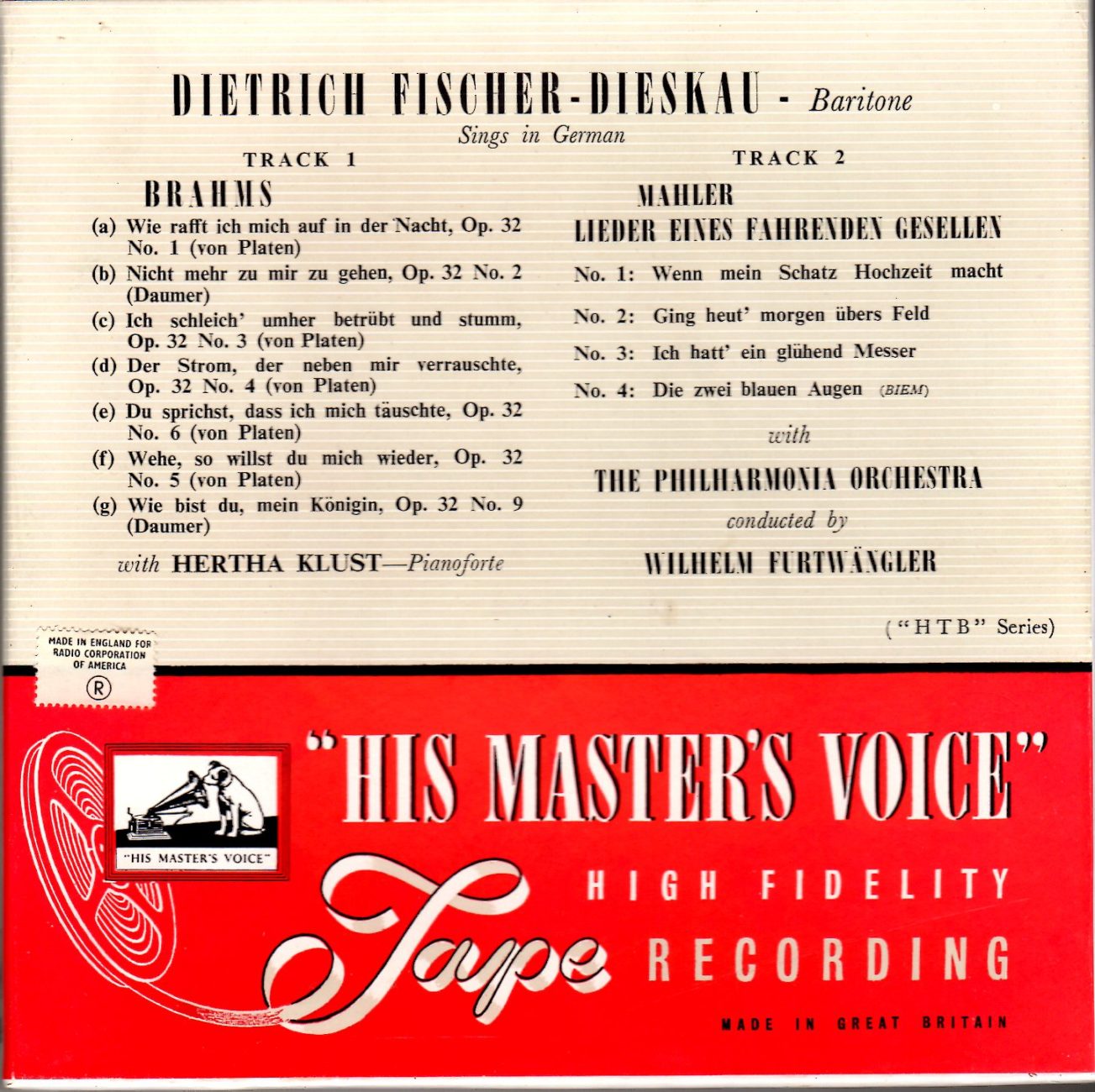
En 1956, HMV a publié ces enregistrements en microsillon (ALP 1270), mais aussi sous forme de bande magnétique HTB 409. Le couplage de ces deux œuvres est inhabituel, et ce d’autant plus que Fischer-Dieskau a enregistré en juin 1955 les Kindertotenlieder de Mahler avec le BPO sous la direction de Rudolf Kempe. Essayons d’en décrypter les raisons:
Les Lieder eines fahrenden Gesellen ont été enregistrés par Fischer-Dieskau et Furtwängler les 24 et 25 juin 1952 en profitant du temps d’enregistrement disponible après les séances consacrées à l’intégrale de Tristan und Isolde de Wagner.
Le 29 novembre 1953, Furtwängler écrit à Walter Legge en évoquant l’enregistrement du Monologue d’Amfortas en projet avec Fischer-Dieskau et le Philharmonia lors de sa venue à Londres en mars 1954: « J’imagine que les Lieder eines fahrenden Gesellen enregistrés avec Fischer-Dieskau n’ont toujours pas été publiés. Comme je fais dans les prochains jours les Kindertotenlieder avec Fischer-Dieskau à Berlin, ce serait semble-t-il une bonne idée de les enregistrer à la place du Monologue d’Amfortas si on dispose d’assez de temps ». Le 3 décembre, Legge confirme ce changement. De plus, entre les deux concerts de Furtwängler prévus avec le Philharmonia au Royal Festival Hall les 5 et 12 mars 1954, un étonnant Récital de Lieder de Schumann avait été programmé le 7 mars dans cette même salle avec Fischer-Dieskau et Schwarzkopf, Furtwängler étant au piano. Legge propose le programme suivant: Dichterliebe, Frauenliebe und Leben et 15 Duos.
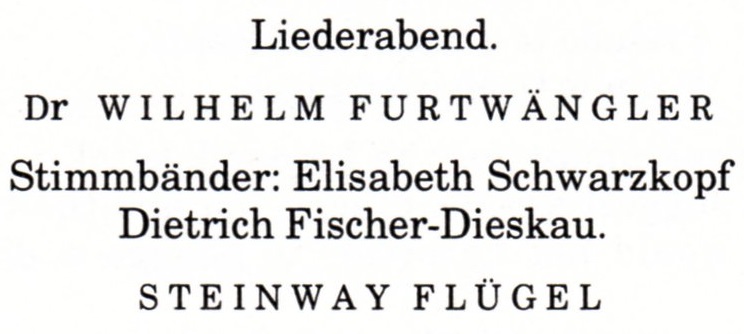
Le 12 janvier 1954, Furtwängler écrit à Legge depuis le sanatorium d’Ebersteinburg (Baden-Baden) où il doit séjourner pour se remettre des effets de ses traitements aux antibiotiques américains qu’il avait pris le mois précédent. Il a du annuler une tournée avec le BPO et une autre (au Portugal) avec le WPO, ainsi qu’une série d’autres concerts. Il annonce en outre qu’il ne pourra assurer à Londres que le concert du 12 mars. Il demande donc d’annuler le concert du 5 mars et le Récital du 7 mars. Le 18 janvier, Legge lui répond en exprimant ses regrets. Le 2 février, Furtwängler lui confirme qu’il ne dirigera que le concert du 12 mars et en confirme le programme. Le 7 février, Furtwängler écrit à Legge pour lui faire savoir que ses médecins l’autorisent finalement à reprendre ses activités le 1er mars et qu’il a programmé une série d’enregistrements avec le WPO (N.B. en fait du 28 février au 8 mars). Il n’est plus question d’enregistrer les Kindertotenlieder. Il n’en sera également pas fait état dans les échanges ultérieurs entre le chef et Legge.
Quant à Fischer-Dieskau, il recherchera activement, mais en vain, un enregistrement des Kindertotenlieder provenant des concerts berlinois de décembre 1953.
Dans ses mémoires, il laisse entendre qu’à l’époque il n’est pas satisfait de l’enregistrement qu’il en a fait avec Rudolf Kempe et le BPO en raison du manque d’entente entre l’orchestre et le chef. Ce sont probablement les raisons du choix du couplage Brahms/Mahler, grâce auquel la subtilité du piano d’Hertha Klust (1907-1970), que d’ailleurs Furtwängler appréciait beaucoup, mais dont la carrière fut semble-t-il abrégée par des problèmes auditifs, répondait à celle de la direction de Furtwängler.
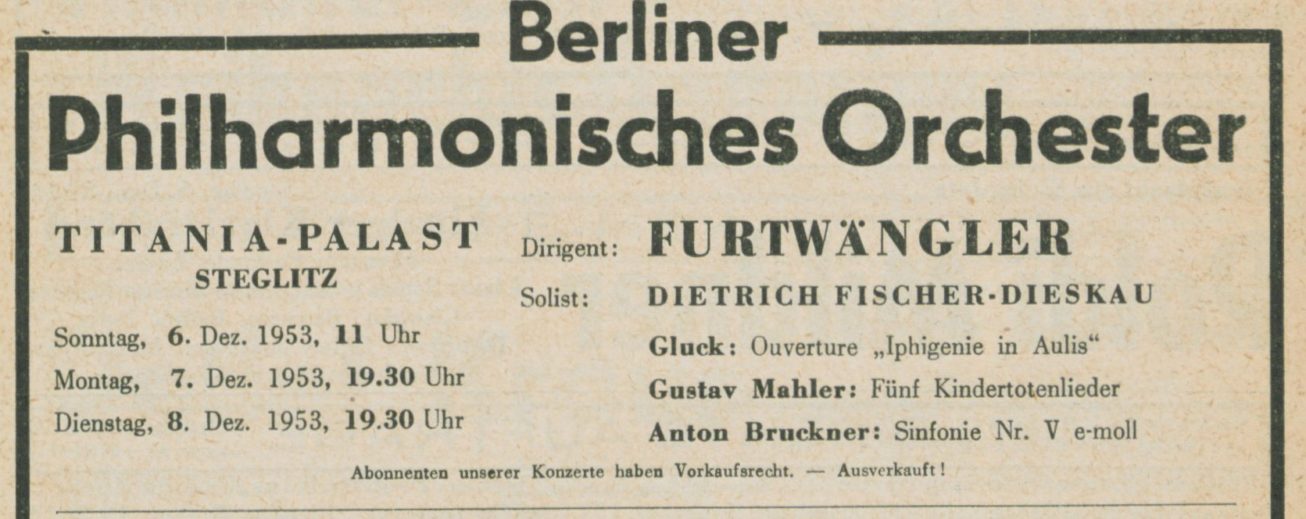
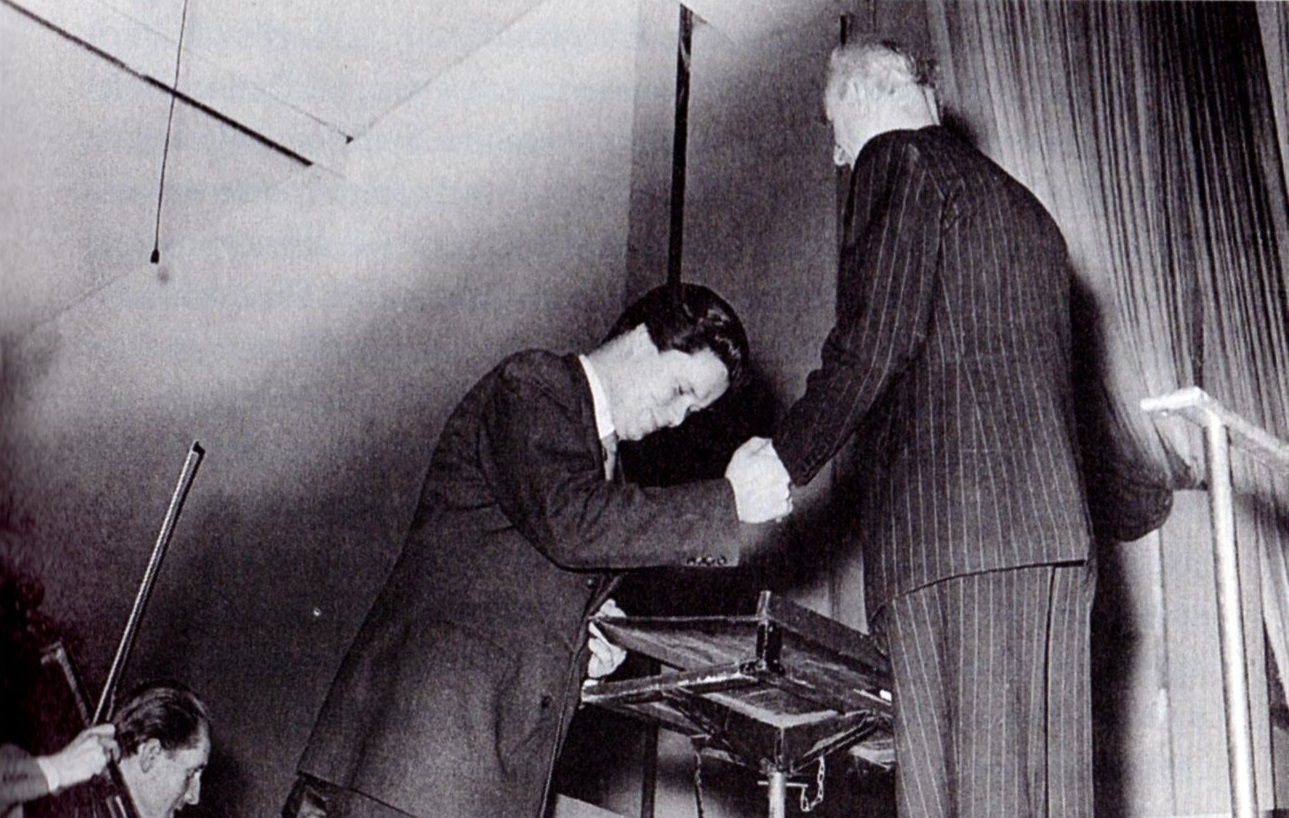
Dietrich Fischer-Dieskau & Wilhelm Furtwängler – Titania Palast Décembre 1953
______________
In 1956, HMV published these recordings as a LP (ALP 1270), but also on a reel-to-reel magnetic tape HTB 409. The coupling of these two works is unusual, al the more so, since Fischer-Dieskau recorded in June 1955 Mahler’s Kindertotenlieder with the BPO conducted by Rudolf Kempe. Let’s attempt an explanation:
The Lieder eines fahrenden Gesellen were recorded by Fischer-Dieskau and Furtwängler on June 24 and 25, 1952 during available recording time further to the sessions devoted to the complete recording of Wagner’s Tristan und Isolde.
On November 29, 1953, Furtwängler writes to Walter Legge and mentions the project recording of the Amfortasmonolog with Fischer-Dieskau and the Philharmonia during his stay in London in March 1954: « I gather that the Lieder eines fahrenden Gesellen with Fischer-Dieskau, which we recorded, have still not been released. As I am doing the Kindertotenlieder with Fischer-Dieskau in Berlin in the next few days, it would seem to be a good idea to record this as well – instead of the Amfortasmonolog – if there is time ». On December 3, Legge confirms the change. Moreover, between both Furtwängler’s concerts arranged with the Philharmonia at the Royal Festival Hall on March 5 and 12, 1954, an astonishing Recital of Lieder by Schumann had been scheduled on March 7 in the same venue with Fischer-Dieskau and Schwarzkopf, Furtwängler being the pianist. Legge suggests the following program: Dichterliebe, Frauenliebe und Leben and 15 Duets.

On January 12, 1954, Furtwängler writes to Legge from the Ebersteinburg sanatorium (Baden-Baden) were he has to stay to undergo a course of treatment which became necessary as a consequence of American antibiotics which were given to him the previous month. He had to cancel a tour with the BPO and another one (in Portugal) with the WPO, as well as a series of other concerts. He also mentions he will be able to conduct only the second London concert on March 12. As a consequence, he requests the cancellation of the March 5 concert as well as of the Recital of March 7. On January 18, Legge answers and expresses his regrets. On February 2, Furtwängler confirms he will conduct only the March 12 concert and also confirms the program. On February 7, Furtwängler writes to Legge to inform him that his doctors can discharge him as early as March 1st and that he has arranged with the WPO to do some recordings during that period (N.B. in fact between February 28 and March 8). It is no longer contemplated to record the Kindertotenlieder. Nor will this recording be further discussed in the next letters between the conductor and Legge.
As to Fischer-Dieskau, his active searches to find a recording of the Kindertotenlieder from the December 1953 Berlin concerts remained fruitless.
In his memoirs, the singer suggests that he was then not satisfied with the recording of this work he made with Rudolf Kempe and the BPO, because of the lack of understanding between the orchestra and the conductor. These are probably the reasons for the choice of the Brahms/Mahler coupling, thanks to which the subtility of the piano of Hertha Klust (1907-1970), whom by the way Furtwängler liked very much, but whose career was most probably shortened by hearing problems, mirrored that of Furtwängler’s conducting.
Les liens de téléchargement sont dans le premier commentaire. The download links are in the first comment.

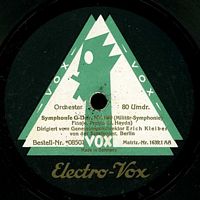
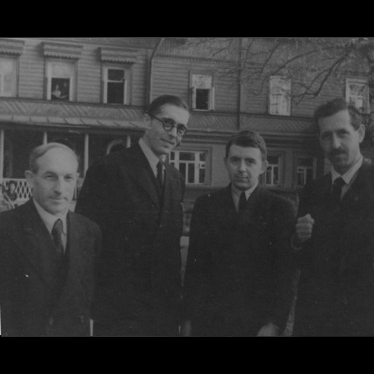
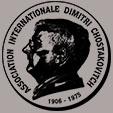
6 réponses sur « Fischer-Dieskau – Brahms: Lieder und Gesänge Op.32 Klust – Mahler: Lieder eines fahrenden Gesellen Philharmonia Orchestra Furtwängler »
HD/Hi-Res (24 bits/88 KHz):
https://e.pcloud.com/publink/show?code=kZDPX5ZceTDWgq0p6mgpDIwOQWtRF0d1MKk
Format CD (16 bits/44 KHz):
https://e.pcloud.com/publink/show?code=kZsPX5ZhpAztpuyVOk9IwxwhwqH0H2Rr6cX
Another fantastic vintage 2-track tape discovery. Thank you so much! Please keep them coming!!!
I heard this on LP many years ago and it’s wonderful to hear it again. This is probably the only way I’ll ever get to hear it, because I don’t think the Brahms was ever released on CD and it probably never will be now.
Thanks for your comment.
In fact, the excerpts from Brahms’ Op.32 with Hertha Klust have been issued in France in 1995 as part of a 6 CD Box called « Les Introuvables de Dietrich Fischer-Dieskau » (7243 5 68509 2 7).
Yes, it is a really wonderful performance.
Bonjour et un vif et chaleureux merci. C’est la période où la voix de DFD me convient le mieux, et tous les lieder enregistrés avec Klust sont à thésauriser.
Merci!
Tout à fait d’accord avec vos remarques.